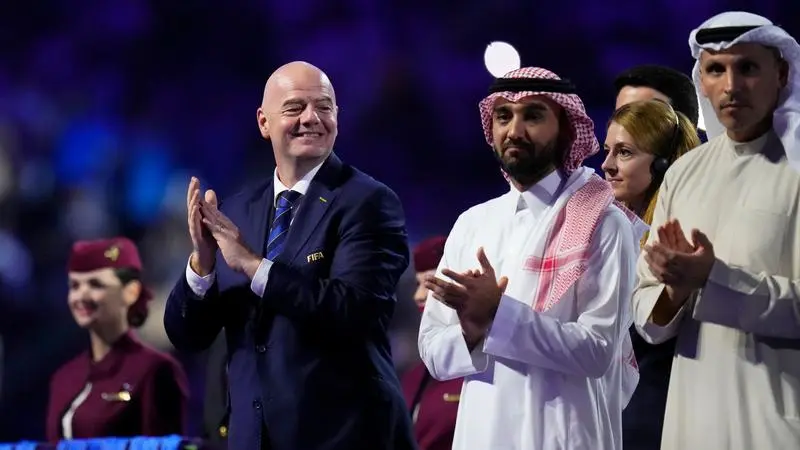What are the key issues around Saudi Arabia being awarded the 2034 World Cup?

Saudi Arabia has achieved arguably its greatest strategic success in sport so far by securing hosting rights to the 2034 men’s World Cup.
Here the PA news agency looks at how this came about, and how it could shape football’s future.
What has happened?
#WelcomeToSaudi34 – a nation's dream made possible thanks our leadership’s vision and ambition of our people.#Saudi34 pic.twitter.com/BOo2KnjGYk
— Saudi Arabia FIFA World Cup 2034™️ (@Saudi2034bid) December 11, 2024
Saudi Arabia’s hosting of the 2034 finals was rubberstamped at an online FIFA Congress on Wednesday afternoon, along with confirmation that Spain, Portugal and Morocco will co-host the centenary finals in 2030, with that tournament’s opening matches being played in South America.
Why is this significant?
FIFA dumped some astonishing documents at midnight:
🇸🇦’Best bid ever’ – FIFA whitewash of Saudi human rights✈️’Low environmental risk’ of 3-continent 2030 World Cup👷🏽Ind report recommending FIFA compensate Qatar migrant workers (which it ignored)
Incredible even for FIFA pic.twitter.com/J2HRo1tJrg
— Steve Cockburn (@stevecockburn) November 30, 2024
It further emphasises the scope of Saudi power and influence in world sport. Groups such as Amnesty International say there will be a huge human cost to staging the finals in the Middle East Kingdom, but the reality is FIFA and its member national associations have pressed ahead anyway.
The relationship between FIFA and Saudi Arabia is already close – the state’s oil and gas company Aramco is a major FIFA sponsor, to the tune of a reported 100million US dollars (£78.4million) a year.
It has also been reported that DAZN, which last week did a reported one billion dollar deal for exclusive global broadcast rights for FIFA’s newly-expanded Club World Cup, could receive significant Saudi investment.
How has this happened?
📷FIFA Council takes key decisions on FIFA World Cup™ editions in 2030 and 2034: Morocco, Portugal and Spain joint bid is the sole candidate to host FIFA World Cup 2030™➡️https://t.co/cKJec1tIE4 pic.twitter.com/mwLRerCIlg
— FIFA Media (@fifamedia) October 4, 2023
Saudi Arabia did not even have to overcome a rival bid – an arrangement for a six-nation hosting of the 2030 finals agreed in October 2023 put them in pole position for 2034, and they ended up being the only candidate.
What have the FAs said?
The English Football Association supported the 2030 and 2034 bids, and its representatives Debbie Hewitt and Mark Bullingham joined in the applause when FIFA president Gianni Infantino called for a vote by acclamation. It released a statement afterwards saying its board had been given assurances by the Saudi federation around human rights.
“We asked them to commit to ensuring all fans would be safe and welcome in Saudi Arabia in 2034 – including LGBTQ+ fans. They assured us that they are fully committed to providing a safe and welcome environment for all fans,” a statement read.
“Football is a global game, and is for everyone. Our commitment to diversity and inclusion means being respectful of all, including all religions and cultures. We also believe that hosting World Cups can be a catalyst for positive change, which is best delivered by working collaboratively in partnership with host nations.
“We will work with FIFA and UEFA to ensure that commitments to respect all human rights are delivered.”
Norway said on Tuesday it would oppose a vote by acclamation, and described the process that had been followed in the bidding process as “flawed”.
Will this be another winter World Cup?
Daytime temperatures in excess of 40 degrees Celsius in the traditional World Cup months of June and July mean it is highly likely the tournament will have to be played in the winter, like the Qatar World Cup was two years ago.
Domestic leagues – already in a legal fight with FIFA over what they say is its unilateral approach to managing the international fixture calendar – will oppose disruption to their competitions.
It promises to create even more chaos than Qatar, with European club competitions now placing heavier demands on the schedule than they did in 2022, and the World Cup itself now a 48-team event instead of 32, which takes up more time.
League sources believe if they are victorious in their European Commission case against FIFA, it will force Gianni Infantino’s organisation to consult more deeply with them and even potentially give them the power to veto the decision to award Saudi Arabia the World Cup.
What have FIFA and the Saudis said?
FIFA president Infantino said: “We are aware of critics and fears and I fully trust our hosts to address all open points.
“We have a transparency that will shape real and lasting change. That is what we expect and what we look forward to, social improvements and positive human rights impacts. That is one of the responsibilities of hosting a World Cup, and the world will of course be watching.”
Saudi sports minister Prince Abdulaziz Bin Turki Al Faisal said: “FIFA Congress, allow me first of all to hand out my thanks to the trust that you have conveyed into the Kingdom of Saudi Arabia.
“It is a day that we invited the entire world to Saudi Arabia. We intend to have an extraordinary version of the World Cup held in our kingdom.”
